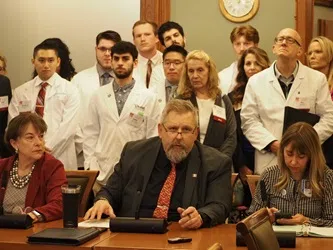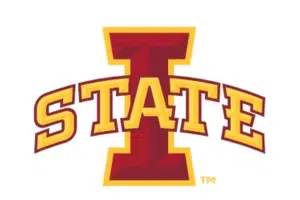(Des Moines) Iowa pharmacists and advocates said Wednesday lawmakers need to pass legislation regulating pharmacy benefit managers, the third-party companies that negotiate prescription prices between health insurance companies, drug manufacturers and pharmacies, in order to keep small businesses and rural pharmacies in business.
Subcommittees were held in both the House and Senate to consider House Study Bill 99 and Senate Study Bill 1074 respectively, companion bills that take multiple steps advocates said would assist local pharmacies.
The bills would require PBMs to reimburse pharmacies for the national or Iowa average acquisition cost for the drug — to use the wholesale acquisition cost as needed. The proposals also would restrict PBMs’ ability to set limits on which pharmacies or pharmacists can fill a person’s prescription if the provider has agreed to participate in that individual’s health benefit plan.
Measures in the legislation also include limiting PBMS from imposing different-cost sharing, or monetary advantages or penalties based on what pharmacy fills the prescription.
It was the Iowa Pharmacy Association’s “Day on the Hill” Wednesday, with more than 180 pharmacists and pharmacy students at the State Capitol to speak to lawmakers about the industry’s needs. The subcommittee meetings were packed with many of these pharmacists, as well as local pharmacy owners and advocates, who praised the measure as a way to help keep rural pharmacies open.
Iowa has lost more than 150 pharmacies in the past decade and 29 pharmacies in 2024, a direct impact of the “the unjust practices of PBMs within our healthcare system,” Kate Gainer, CEO of the Iowa Pharmacy Association, said in a news release.
At the House subcommittee hearing, Gainer said she was hopeful the Iowa lawmakers will pass a measure to better regulate these companies, saying the legislation would benefit Iowans and Iowa local businesses.
“Meaningful PBM reform provides regulatory oversight and authority to our state over these powerful middlemen that control much of the pharmaceutical supply chain and control drug pricing and reimbursement to our state’s pharmacies,” Gainer said. “Meaningful PBM reform brings transparency to (the) very opaque practices of PBMs in our state. Meaningful PBM reform will benefit patients with lower out-of-pocket costs … and also freedom to choose where they receive their care and pharmacy services.”
Kelly Kent, co-owner of the eastern Iowa pharmacy chain Towncrest Pharmacy, shared a story at the Senate subcommittee meeting about having a child patient who needed a specific, brand name seizure medication each month.
“Every month when we fill this medication, we lose $300,” she said. “Every single month. We’ve done this for years, because it’s the right thing to do for our patient. Now these prescriptions that we’re losing money on, it’s becoming more and more and more common. We haven’t been able to get any relief in regards to the cost of the medication. Over the past couple of weeks, we’ve had to have a difficult conversation with this patient’s mother to say ‘I’m sorry, we can’t provide this medication anymore.’ … What this means for my patient is that her mother now has to travel 30 miles (to get that medication.)”
Charlie Hartig, CEO of the regional pharmacy chain Hartig Drug, told lawmakers that it may seem odd for a business to say they’d love to competitors, but “in this market, I would love a competitor.”
“I’m concerned for these communities as they are now considered pharmacy deserts,” Hartig said. “For example, our Hartig Drug location in Waukon is now servicing about a 30- to 40-mile radius. Our pharmacists are working collaboratively with providers, but the geography is becoming a challenge.”
He said the bill will ensure Iowans have “choice and access to our pharmacies,” saying the measure would allow local pharmacies to work with patients who have complex health needs instead of being required to have their prescriptions filled by mail order.
But speakers with some insurance and business organizations said though they sympathize with Iowa pharmacies’ struggles, the legislation could drive up health care prices for Iowans. Scott Sundstrom with Wellmark Blue Cross Blue Shield, a health insurance provider, said that the bill makes a “tremendous number of changes to how that supply chain and the payment would work” on prescription drugs.
“When somebody in the supply chain is paid more money, that money will have to come from somewhere,” Sundstrom said. “And, I think the almost certain result is that will come out of the pockets of Iowans, whether it’s the employers who sponsor health plans or those about to go to the pharmacy counter, will have to bear these costs one way or another.”
Sen. Mike Klimesh, R-Spillville, said he has spoken with the West Virginia Insurance Commission about this legislative proposal, as the state implemented a similar measure in 2024 that has not led to increases in costs for patients.
“We can do better in Iowa — we see the country doing better,” he said. “… There’s talk of cost drivers and increases — it hasn’t manifested itself in most states that have taken actions that need to be taken.”
The bills passed out of both subcommittees Wednesday and are available for consideration in the House Commerce Committee and Senate Health and Human Services Committee.
Dozens of pharmacists, students and pharmacy owners attended the Senate subcommittee meeting Feb. 5, where Sens. Annette Sweeney, left, Mike Klimesh and Sarah Trone Garriott heard public comments on a bill related to pharmacy benefits managers. (Photo by Robin Opsahl/Iowa Capital Dispatch)













